

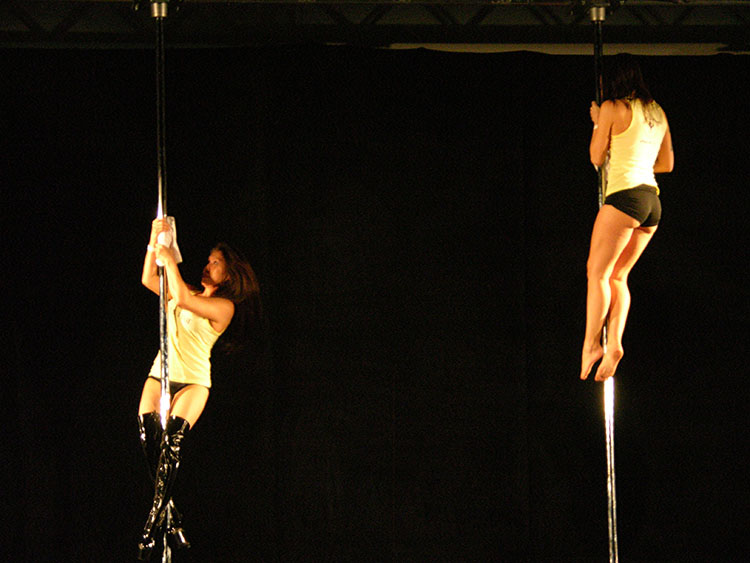 The music starts: Sara Bareilles sings about falling into a moment of gravity,
and two women approach the poles standing in the middle of the stage. They have
cloths in their hands: they start to climb the poles, and then they begin to polish
and clean them, getting them ready for the next competitor.
The music starts: Sara Bareilles sings about falling into a moment of gravity,
and two women approach the poles standing in the middle of the stage. They have
cloths in their hands: they start to climb the poles, and then they begin to polish
and clean them, getting them ready for the next competitor.
Welcome to the Pole Sport Organization's 2014 Pacific Pole Championship. Held the weekend of
March 1 & 2 at the Los Angeles Convention Center, this is the regional competition for the
states of Alaska, Arizona, California, Colorado, Hawaii, Idaho, Montana, Nevada, New Mexico,
Oregon, Utah, Washington and Wyoming. The two day event was for both amateurs and professional
pole artists, and had over 250 participants competing.
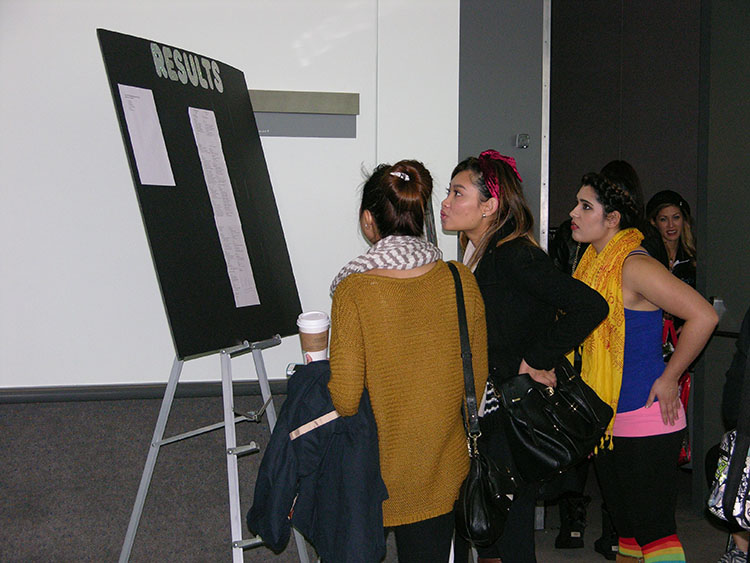 "Most of the other competitions, except for ours, you have to submit a video in order
to be selected to perform on stage." So says Amy Guion, co-founder of Pole Sport Organization,
who runs competitions for four regions (Pacific, Atlantic, Southern and Central) as well as
national competitions. Guion started the organization with co-founder DJ Pettigrew in 2001,
and has been putting on competitions since 2012. "Why shouldn't everybody be able to have the
chance to compete live?" Guion says as for her reason for starting the competitions. "Even if
they're not at a professional level, or not at the highest level possible for the area, I think
it's really important to provide performance opportunities for everybody."
"Most of the other competitions, except for ours, you have to submit a video in order
to be selected to perform on stage." So says Amy Guion, co-founder of Pole Sport Organization,
who runs competitions for four regions (Pacific, Atlantic, Southern and Central) as well as
national competitions. Guion started the organization with co-founder DJ Pettigrew in 2001,
and has been putting on competitions since 2012. "Why shouldn't everybody be able to have the
chance to compete live?" Guion says as for her reason for starting the competitions. "Even if
they're not at a professional level, or not at the highest level possible for the area, I think
it's really important to provide performance opportunities for everybody."
The competition aspect is definitely an area those interested in pole are eager for. "I think
naturally when people start to get good at things, they want to be able to judge themselves
against their peers and be told from a panel of quote/unquote experts what they feel like they
could work better on," says Ellen Lovelace, one of the judges of this year's pole championship.
"I think a lot of people are very much just eager for an opportunity to get on stage and perform,
and competitions happen to be some of the only ways around to do it."
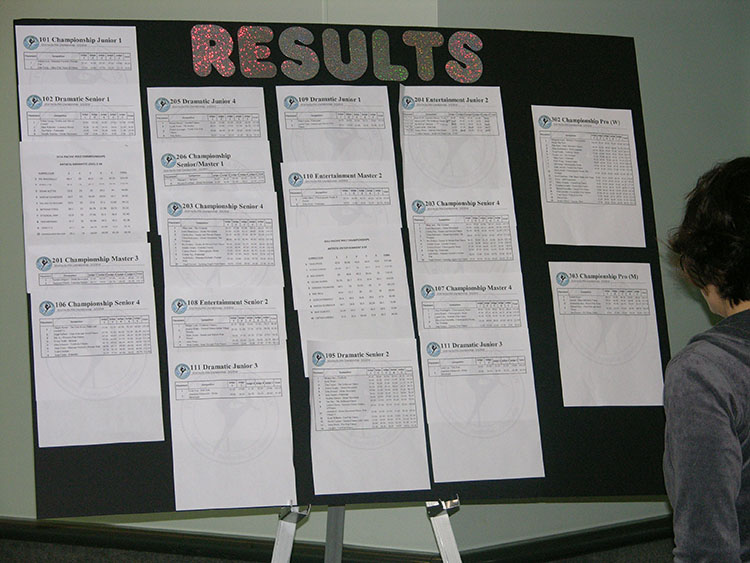 The championships are divided into five levels: four levels for amateurs and one professional.
There are also different events: championship, for those wishing to compete in a more technical
area; entertainment, for competitors less interested in the tricks and more in the dance aspect
in a more comical or upbeat way; dramatic, similar to entertainment, but with a more serious tone
to it; and then the showcase, which is performance-only and not judged.
The championships are divided into five levels: four levels for amateurs and one professional.
There are also different events: championship, for those wishing to compete in a more technical
area; entertainment, for competitors less interested in the tricks and more in the dance aspect
in a more comical or upbeat way; dramatic, similar to entertainment, but with a more serious tone
to it; and then the showcase, which is performance-only and not judged.
Judges look for a wide range of things, from the tricks used to the choreography to how much the act
fits the music chosen. In order to qualify for a judge, you must be a teacher or studio owner within
the pole community. "We give them a questionnaire after they tell us they're interested so that we can
get a better sense of where their skill level falls," Guion says. "For example, somebody like myself,
I've been teaching for seven years and dancing for 15 or 17 years. So, I'm going to be qualified to
judge at a higher level than, say, somebody who's just been teaching for the past six months." The
organization also makes sure that judges aren't scoring competitors who are from the same studio. The
judges then get a training manual and scoring sheets, and are given training sessions on the specifics of the competition.
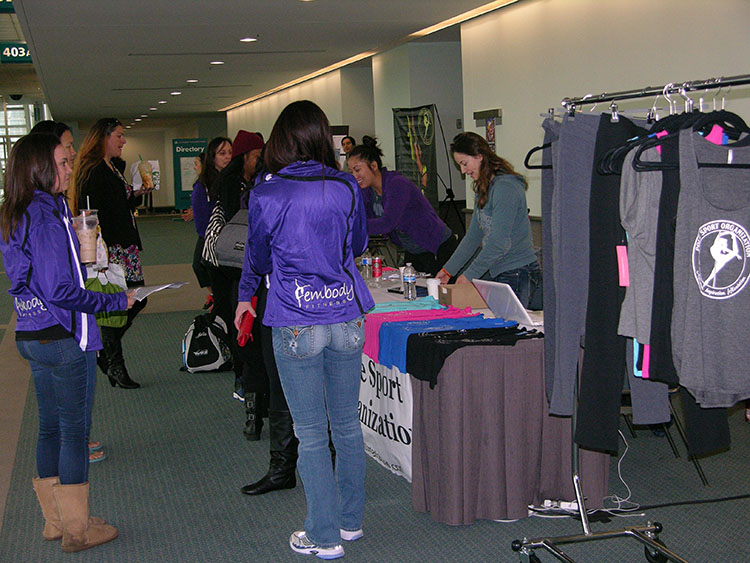 The competition is funded through registration fees, vendor fees and tickets. Registration fees for
the upcoming Central Championship (May 24-25 in Chicago) are $90 for the first event for amateurs
($150 for professionals), and $60 for each additional event. Meanwhile, vendors can purchase program ads,
rent a booth at the event, or become a sponsor that includes various combinations depending on the level
of sponsorship. Finally, tickets for the Pacific version were $35 for day passes, with the professional
showcase costing between $55 and $75.
The competition is funded through registration fees, vendor fees and tickets. Registration fees for
the upcoming Central Championship (May 24-25 in Chicago) are $90 for the first event for amateurs
($150 for professionals), and $60 for each additional event. Meanwhile, vendors can purchase program ads,
rent a booth at the event, or become a sponsor that includes various combinations depending on the level
of sponsorship. Finally, tickets for the Pacific version were $35 for day passes, with the professional
showcase costing between $55 and $75.
The other aspect of the competition is the ability to meet with other pole artists, and interact with the
community. "There's a wide range of people," says Sabrina Nicole, a 23 year old competing at level 2 junior
level. "Everyone from 62 year old ladies to 18 year old people just trying to have fun and a little bit of
in between," she says. "It's not just for the strip clubs anymore."
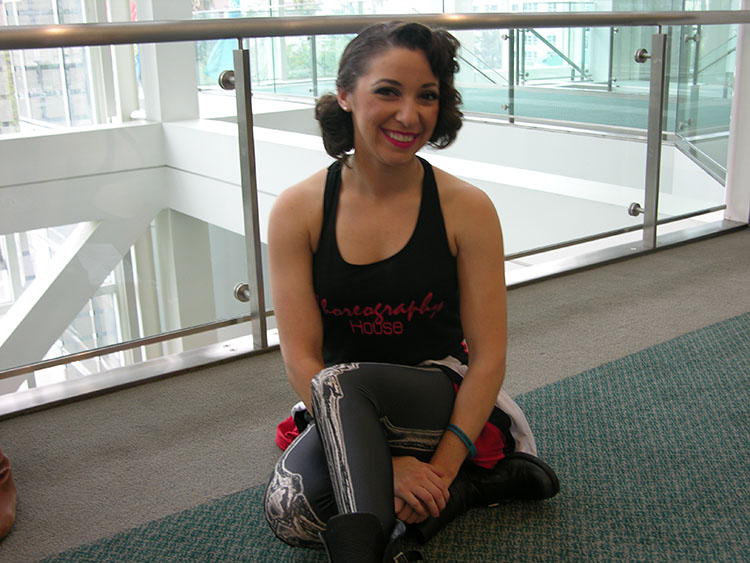 But that stigma of it being linked to strippers is something that sticks around. One of the competitors
goes by the name of Tilly Erikson because of said stigma, knowing the people at her job wouldn't understand.
"It's not strip aerobics," she says. "No, I don't do this to make my boyfriend happy, and I do it competitively
and professionally. It's more than what they think, and it's more strength than you can ever imagine until you
try it. I work in a professional field where it's not exactly encouraged to have a more out there type of hobby.
It's unfortunate, and it's something that you kind of have to deal with, but I've changed a lot of opinions with
videos and showing them what it's really like."
But that stigma of it being linked to strippers is something that sticks around. One of the competitors
goes by the name of Tilly Erikson because of said stigma, knowing the people at her job wouldn't understand.
"It's not strip aerobics," she says. "No, I don't do this to make my boyfriend happy, and I do it competitively
and professionally. It's more than what they think, and it's more strength than you can ever imagine until you
try it. I work in a professional field where it's not exactly encouraged to have a more out there type of hobby.
It's unfortunate, and it's something that you kind of have to deal with, but I've changed a lot of opinions with
videos and showing them what it's really like."
Said stigma even affects the competition side of it: Guion talks about how sometimes the venues have an issue
with the concept and she has to show them that there are strict costume requirements and has to show that it is a sport that is challenging.
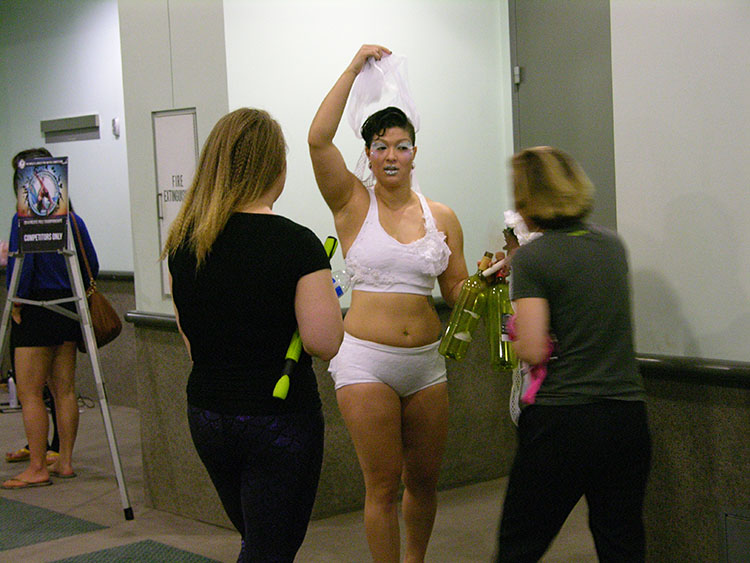 Lovelace, however, has a slightly different viewpoint. "The reality is that's where pole came from, you know?"
she says. "Pole started in erotic dance clubs. I don't think that there's anything wrong with that, and I don't
think there's any reason to deny the history of it. But I think also that I would tell people to look at some videos,
go to a competition, and see what's being done out there, and understand that it's incredibly hard, it's incredibly
challenging, that men do it, too, and that it really is a fitness and sport as well as art."
Lovelace, however, has a slightly different viewpoint. "The reality is that's where pole came from, you know?"
she says. "Pole started in erotic dance clubs. I don't think that there's anything wrong with that, and I don't
think there's any reason to deny the history of it. But I think also that I would tell people to look at some videos,
go to a competition, and see what's being done out there, and understand that it's incredibly hard, it's incredibly
challenging, that men do it, too, and that it really is a fitness and sport as well as art."Guion also states that the best way to combat the stereotype people have when they first hear of pole sport is to see what's out there. "Go see a show. You have to come see something, because there's not one single person that comes to our shows that leaves with the same mindset. Even if you're not biased against pole but you're kind of like, 'Eh, pole's okay' but don't get it, if you come to one of our shows, you'll get it. It doesn't have to be my show - it can be anybody's show. But watch something, go take a class, experience it for yourself."